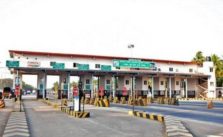The President Muhammadu Buhari led federal government has given a list of conditions that must be met for it to reopen its borders with neighbours.
The Minister of Foreign Affairs, Geoffrey Onyeama, alongside members of the Inter-ministerial committee on the temporary partial closure of land borders, held a press briefing in Abuja on Monday to discuss the issues.
The nation’s borders have been closed for several weeks in a move the government said was to grow the local economy and reduce illegal importation.
The issue has generated controversy in the economy with many condemning the government for not providing palliatives to curb the expected rise in basic goods for families. Some also argue that the border closure violates Nigeria’s agreements within ECOWAS and the African Continental Free Trade Agreement.
Other Nigerians have, however, commended the initiative saying it would help increase local production and use of made-in-Nigerian goods.
According to the Premium times, reported officials of the federal government saying the closure has led to increased revenue for the Nigeria Customs Service and a reduction in the volume of petrol smuggled outside Nigeria. Mr Buhari has since extended the border closure to January next year.
Conditions
Some conditions were agreed upon by members of the Nigerian side of the tripartite committee set up to review the policy.
The conditions as stated by Mr Onyeama are as follows:
– Any
import coming from outside an ECOWAS region and imported into an ECOWAS
member state must maintain its original packaging. They must be
escorted from the port directly to the designated entry point in the
Nigerian border, presented to the Nigerian customs with their original
packaging. Compromises will not be tolerated.
– Goods
produced predominantly in ECOWAS member states must satisfy the ECOWAS
rules of origin to avoid any possibility of downplay. Goods must be
majorly produced in ECOWAS countries.
If the goods are coming
from outside ECOWAS, the value addition must be over 30 per cent for it
to be accepted within the framework of the Economic Trade Liberalisation
Scheme that ECOWAS countries have to promote trade among them.
This
is to avoid countries outside member states from exporting their goods
into ECOWAS region repackaged, as though they are coming from an ECOWAS
region.4
– All warehouses along the shared borders of Nigeria must be dismantled.
– Goods
being transported must be put in proper recognized packaging. No longer
will we have goods of all shapes and sizes going through the borders.
To maintain the best practices of those goods, an accepted condition for
packaging will be established.
– In regards to free
movements of persons, all persons moving through Nigerian borders must
present themselves through recognized entry points and must have
recognized travel documents (country passport).
Review
In two weeks Nigeria will be hosting a tripartite meeting (Niger, Benin, and Nigeria) to further review the policy.
Heads
of ministries of foreign affairs, interior, finance, customs,
immigration, NIA and other security segments will form the committees of
each country represented.
